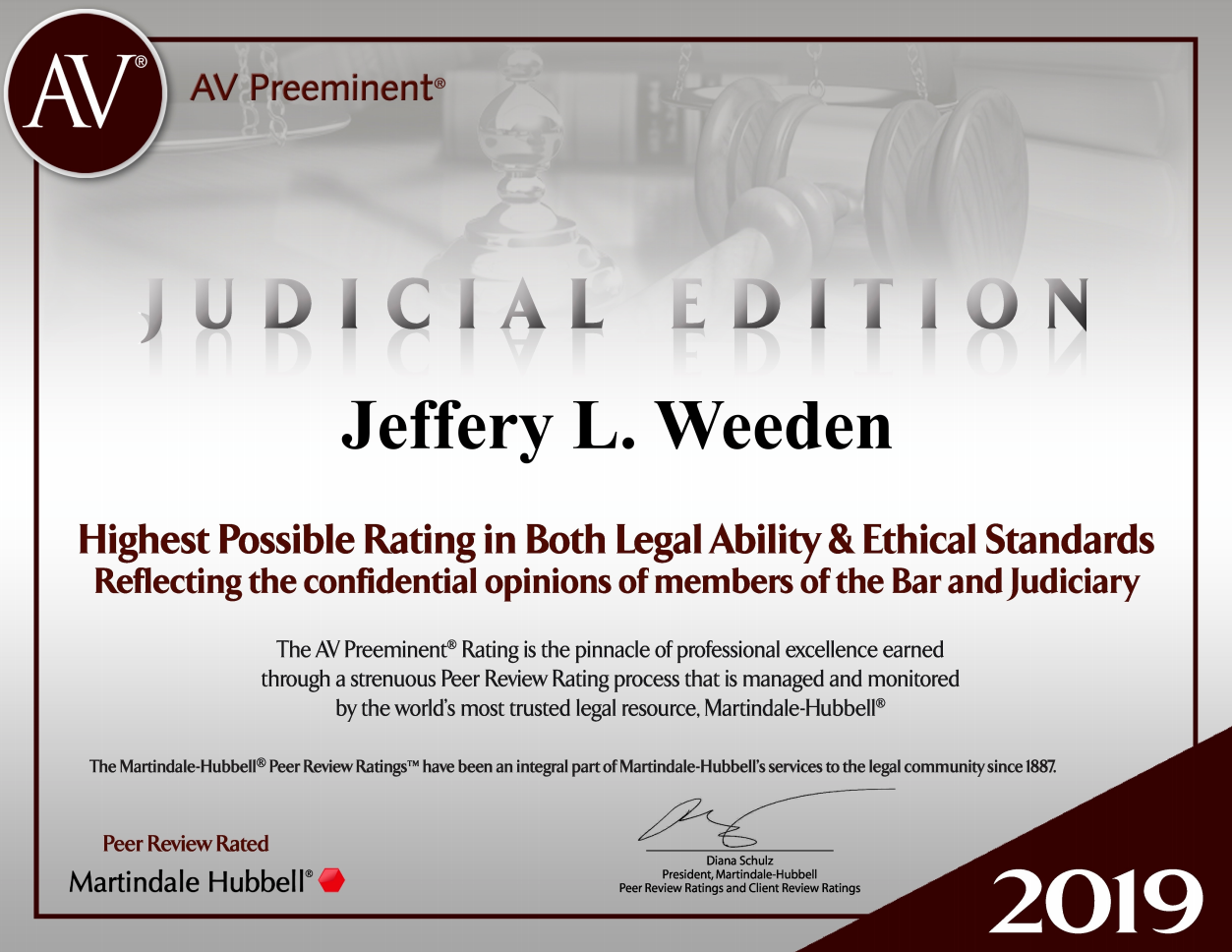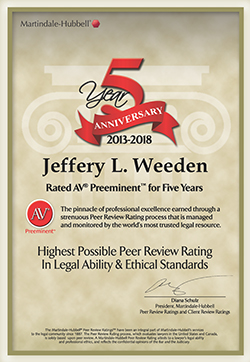When faced with harassment charges in Denver, the choice of legal representation can profoundly impact the outcome of your case. WeedenLaw offers exceptional defense services with a focus on harassment cases. Denver criminal defense lawyer Jeff Weeden brings a wealth of experience and a dedicated approach to each case, ensuring your rights are vigorously defended.
At WeedenLaw, we understand the complexities of Colorado harassment law, positioning us to provide effective, personalized legal strategies tailored to your specific situation. Trust WeedenLaw to stand by your side with expertise, integrity, and unwavering commitment to achieving the best possible outcome for your case.
To discuss your charges with one of our experienced Denver harassment attorneys, call WeedenLaw at (720) 307-4330 to schedule a free consultation today.
Is Harassment a Crime in Colorado?
In Colorado, harassment is recognized as a criminal offense, with the severity of charges determined by the specific nature of the behavior. These charges can range from petty offenses, typically involving minor nuisances, to more serious misdemeanors, which include cases of significant distress or fear caused to the victim. This difference in legal consequences reflects the state’s commitment to addressing different forms of harassment appropriately, ensuring justice and protection for victims while imposing penalties equal to the offense.

Harassment Definition Colorado
Harassment is legally defined under Colorado Revised Statutes Section 18-9-111. This law characterizes harassment as a deliberate and intentional behavior directed at a specific individual or their immediate family, which significantly alarms, annoys, or causes distress without any legitimate purpose.
Actions that fall under this definition include repeated unwanted contact, making obscene gestures, physical aggression, verbal taunting, or following someone in a public space intending to disturb or unsettle them.
As a criminal offense in Colorado, harassment can lead to varying charges, from petty offenses to misdemeanors, depending on the severity and context of the actions.
Kiana Arellano’s Law
Colorado Revised Statutes Section 18-9-111 is also known as Kiana Arellano’s Law. It was named in honor of Kiana, a high school student who was the victim of severe cyberbullying, which led to a serious and life-altering incident. In response to her story and the growing concern about the impacts of bullying and harassment, especially in the digital age, this law was enacted to offer more comprehensive protection against various forms of harassment.
Under Kiana Arellano’s Law, the legal definition of harassment in Colorado was expanded to include a range of behaviors, such as physical contact, stalking, repeated communications that cause annoyance or alarm, and other menacing behaviors, with the intent to harass, annoy, or alarm another person. This law addresses not just traditional forms of harassment but also modern forms like cyberbullying, making it a more relevant and effective tool in today’s digital world.
CRS § 18-9-111
As mentioned above, CRS § 18-9-111 categorizes various behaviors as harassment if they are intended to harass, annoy, or alarm another person. To be considered harassment under this law, the offender must act with the intent to harass, annoy, or alarm another person. They must also perform one of the following actions:
- Engages in striking, shoving, kicking, or offensive physical contact with the victim.
- Directs obscene language or gestures towards the victim in public, including explicit descriptions of sexual acts.
- Follows the victim in public spaces.
- Repeatedly calls the victim without the intent of having a legitimate conversation.
- Initiates communication at inappropriate times, thereby invading the victim’s privacy, through various means like in-person contact, phone calls, or electronic communication, including emails and social media.
- Repeatedly taunts the victim in a manner that could provoke a violent or disorderly response, such as inciting violence through ‘fighting words’ with the intent to threaten bodily injury, property damage, or to harass.
- Makes obscene or threatening remarks through phone or internet communications, commonly referred to as “cyber-bullying.”

Types of Harassment
Harassment manifests in various forms, each with unique characteristics and impacts. Listed below are the diverse types of harassment, ranging from physical and verbal to the increasingly prevalent digital forms such as cyberbullying.
Verbal Harassment
Derogatory remarks, threats, offensive jokes, and persistent unwelcome comments often fall under this type of harassment. While it may not involve physical harm, verbal harassment can have profound psychological effects on victims, leading to decreased self-esteem, stress, and anxiety. It’s often challenging to regulate due to its subjective nature.
Physical Harassment
Physical harassment involves unwanted and inappropriate physical contact or threats, which can range from minor actions like unsolicited touching to more aggressive behaviors like hitting or shoving. This form of harassment is a serious violation of personal boundaries. It not only poses a direct threat to the physical safety of individuals but also creates a climate of fear and discomfort.
Sexual Harassment
Sexual harassment is characterized by unwanted sexual advances, requests for sexual favors, and other sexually explicit verbal or physical conduct. It can manifest in various forms, from inappropriate jokes and comments to physical assault. This type of harassment is not only a violation of personal dignity but also a significant barrier to equality, often creating hostile or offensive environments, particularly in the workplace or educational settings.
Workplace Harassment
Workplace harassment can include verbal abuse, such as offensive jokes or insults, sexual harassment, discrimination based on race, gender, or other personal characteristics, and even physical intimidation. Such behaviors not only violate an individual’s dignity but also impede their ability to perform effectively.
Cyberbullying / Online Harassment
Cyberbullying, also known as online harassment, represents a modern, digital form of abuse characterized by the use of electronic communication to bully, intimidate, or harass an individual. Cyberbullying occurs via social media, text messages, emails, and other online platforms, involving tactics like spreading rumors, posting hurtful or threatening messages, or sharing personal or sensitive information without consent. This virtual nature often allows offenders a degree of anonymity, making it difficult to trace and confront.

Domestic Violence Harassment
Domestic violence harassment occurs within intimate relationships or family settings and is identified by a pattern of coercive, threatening, and controlling behaviors. It can include stalking, persistent unwanted contact, intimidation, and threats of harm to the victim or their loved ones. This type of harassment often aims to instill fear and assert control over the victim, significantly impacting their sense of safety and autonomy.
Stalking
Stalking is harassing behavior characterized by persistent and unwanted attention that instills fear or distress in the victim. It involves a pattern of behavior where an individual repeatedly follows, contacts, or monitors another person without their consent. This can include showing up uninvited at the victim’s home or workplace, sending unwanted messages, or using technology to track their movements. Stalking is particularly dangerous because it often escalates over time, and the continuous nature of the behavior can lead to significant psychological trauma for the victim.
Racial/Religious/Disability Harassment
Racial, religious, and disability harassment involves targeted, derogatory behavior based on an individual’s race, religion, or disability. This form of harassment can manifest in various ways, including offensive remarks, stereotypes, exclusionary practices, or even physical threats and attacks. Such behavior not only inflicts emotional and psychological harm on the victims but also fosters a climate of discrimination and intolerance. This type of harassment is particularly damaging as it attacks fundamental aspects of a person’s identity and dignity.
Penalties for Harassment in Colorado
Colorado harassment charges vary depending on the severity and nature of the offense. Harassment can be charged as a petty offense, class 1, 2, or 3 misdemeanors, with each level carrying different legal consequences. Penalties range from fines for lesser offenses to jail time for more severe cases. Listed below are the various harassment offenses and their penalties.
Directing obscene gestures or language towards another person in public
- Petty Offense
- Maximum ten days in jail and/or
- $300 in fines
Unlawfully touching someone or following a person in public
- Class 1 Misdemeanor
- Maximum 364 days in jail and/or
- $1,000 in fines
Harassment rooted in discrimination, targeting an individual based on their actual or perceived race, color, religion, ancestry, national origin, physical or mental disability, or sexual orientation
- Class 1 Misdemeanor
- Maximum jail sentence of 364 days and/or
- $1,000 in fines
Any other types of harassment
- Class 2 Misdemeanor
- A jail sentence of up to 120 days and/or
- $750 in fines

What To Do If You’re Accused of Harassment in Denver
If you’re arrested on harassment charges in Denver, taking steps to protect your rights is crucial. First and foremost, exercise your right to remain silent and avoid discussing the details of your case with law enforcement or others, as anything you say can be used against you in court. Politely request an attorney and refrain from making any decisions or signing any documents until you have legal representation.
Contacting a skilled criminal defense lawyer from WeedenLaw, who understands the nuances of Denver’s harassment laws, should be your next action. Your Denver criminal defense attorney can provide crucial guidance on navigating the legal system, advise you on the best course of action, and work towards building a strong defense.
Collect and preserve any evidence supporting your case, including communications, witness information, and relevant documents. It’s advisable to comply with all court orders and legal processes while your case is being handled. Remember, being arrested is not the same as being convicted, and a knowledgeable attorney can play a pivotal role in the outcome of your case.
Call Denver Criminal Defense Attorney Jeff Weeden at WeedenLaw for Experienced Defense Against CO Harassment Charges
When facing harassment charges in Colorado, the expertise of a seasoned criminal defense attorney can be invaluable. Jeff Weeden at WeedenLaw offers seasoned defense strategies tailored to the complexities of Colorado’s harassment laws. His deep understanding of the legal system and commitment to upholding your rights make him a formidable advocate in these challenging situations.
If you are dealing with harassment charges in Denver, don’t navigate this alone. Reach out to Jeff Weeden at WeedenLaw for a defense that is not only experienced but also empathetic and dedicated to achieving the best possible outcome for your case. Your peace of mind and legal standing are paramount, and with Jeff Weeden, you’re in capable hands.
Call WeedenLaw at (720) 307-4330 or contact us online to schedule a free consultation with one of our Denver criminal defense attorneys today.

































